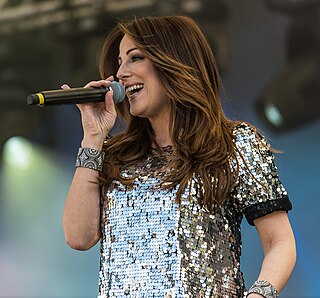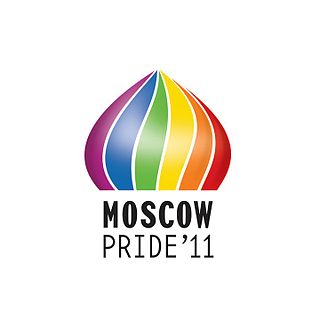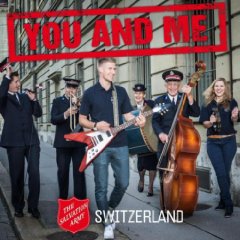Related Research Articles
The Eurovision Song Contest, sometimes abbreviated to ESC and often known simply as Eurovision, is an international song competition organised annually by the European Broadcasting Union (EBU), featuring entries from primarily European countries. Each participating country submits an original song to be performed on live television and radio, transmitted to national broadcasters via the EBU's Eurovision and Euroradio networks, with competing countries then casting votes for the other countries' songs to determine a winner.

The Gay Games is a worldwide sport and cultural event that promotes acceptance of sexual diversity, featuring lesbian, gay, bisexual, and transgender (LGBT) athletes, artists and other individuals.

The Eurovision Song Contest 1997 was the 42nd edition of the annual Eurovision Song Contest, held on 3 May 1997 at the Point Theatre in Dublin, Ireland. Organised by the European Broadcasting Union (EBU) and host broadcaster Radio Telefís Éireann (RTÉ) and presented by Irish television and radio presenter Carrie Crowley and Irish singer Ronan Keating, the contest was held in Ireland following the country's victory at the 1996 contest with the song "The Voice" by Eimear Quinn. The 1997 contest was the seventh edition to be staged in Ireland, as well as the fourth to be produced by RTÉ in five years. The Point Theatre served as the host venue for the third time, following the 1994 and 1995 contests, becoming the only venue to have been the site of three Eurovision Song Contests.

Sharon Cohen, professionally known as Dana International, is an Israeli pop singer. She has released eight albums and three additional compilation albums. She was the winner of the Eurovision Song Contest 1998 in Birmingham with the song "Diva".

Ira Losco M.Q.R. is a Maltese pop singer. Her career breakthrough came in 2002, when she represented Malta in the Eurovision Song Contest 2002 with the song "7th Wonder". She placed second in the competition, Malta's best ever result. Fourteen years later, she returned and represented Malta in the Eurovision Song Contest 2016 with the song "Walk on Water", placing twelfth. Losco has released six studio albums so far in her career and is one of the most successful Maltese musicians of all time. In 2018, she served as a judge on the inaugural season of X Factor Malta. She returned to serve as a judge in 2019.

The O.A.C.A. Olympic Indoor Hall, which is a part of the Olympic Athletic Center of Athens (O.A.C.A.) «Spyros Louis», was completed in 1995, and was the largest indoor venue in use for sporting events at the 2004 Summer Olympics in Athens, Greece. It is located in Marousi, a suburban town within the Athens agglomeration. It is considered to be one of the biggest and most modern indoor sports arenas in all of Europe.

The Palace of Sports is an indoor sport-concert complex situated in the center of Kyiv, Ukraine. The complex is an independent state enterprise.
Eurovision is a pan-European television telecommunications network owned and operated by the European Broadcasting Union (EBU). It was founded in 1954 in Geneva, Switzerland, and its first official transmission took place on 6 June 1954. However, a year before the official launch, on 2 June 1953 the coronation of Elizabeth II was one of the first events to be broadcast across Europe.
Eurogames may refer to:
The 1st World Outgames took place in Montréal, Quebec, Canada from July 26, 2006, to August 5, 2006. The international conference was held from July 26 to the 29. The sporting events were held from July 29 to August 5.

LGBT people in Azerbaijan face legal and social challenges not experienced by non-LGBT residents. Same-sex sexual activity has been legal in Azerbaijan since 1 September 2000. Nonetheless, discrimination on the basis of sexual orientation and gender identity are not banned in the country and same-sex marriage is not recognized.

Moscow Pride is a demonstration of lesbians, gays, bisexuals, and transgender persons (LGBT). It was intended to take place in May annually since 2006 in the Russian capital Moscow, but has been regularly banned by Moscow City Hall, headed by Mayor Yuri Luzhkov until 2010. The demonstrations in 2006, 2007, and 2008 were all accompanied by homophobic attacks, which was avoided in 2009 by moving the site of the demonstration at the last minute. The organizers of all of the demonstrations were Nikolai Alekseev and the Russian LGBT Human Rights Project Gayrussia.ru. In June 2012, Moscow courts enacted a hundred-year ban on gay pride parades. The European Court of Human Rights has repeatedly ruled that such bans violate freedom of assembly guaranteed by the European Convention of Human Rights.
Romania participated in the Eurovision Song Contest 2012 with the song "Zaleilah" written by Elena Ionescu, Costi Ioniță and Omar Secada. The song was performed by the band Mandinga. The Romanian broadcaster Televiziunea Română (TVR) organised the national final Selecția Națională 2012 in order to select the Romanian entry for the 2012 contest in Baku, Azerbaijan. Fifteen entries were selected to compete in the national final on 10 March 2012 where "Zaleilah" performed by Mandinga was selected as the winner after scoring top marks from a nine-member jury panel and a public televote.

Thomas Neuwirth is an Austrian singer and drag queen who is known for his stage persona Conchita Wurst. Neuwirth came to international attention after winning the Eurovision Song Contest 2014 as Austria's entrant with the song "Rise Like a Phoenix". Neuwirth has stated that he is not a trans woman. He is gay, and has also described himself as a drag queen. He uses she/her pronouns to describe his Conchita Wurst character, but he/him pronouns when referring to himself.

"You and Me" is a song recorded by Swiss group Takasa, a band composed of six members of the Swiss Salvation Army.

Ryan Dolan is an Irish pop singer from Strabane in County Tyrone, Northern Ireland. He is known for representing Ireland in the 2013 Eurovision Song Contest with "Only Love Survives".
Austria participated in the Eurovision Song Contest 2014 with the song "Rise Like a Phoenix", written by Charlie Mason, Joey Patulka, Ali Zuckowski and Julian Maas. The song was performed by Conchita Wurst, the drag stage persona of Tom Neuwirth, who had risen to fame after taking part in an Austrian talent show in 2011 and attempting to represent Austria at the Eurovision Song Contest 2012. In September 2013 the Austrian broadcaster Österreichischer Rundfunk (ORF) announced that they had internally selected Wurst to compete at the 2014 contest in Copenhagen, Denmark, with her song presented to the public in March 2014.

"Together" is a song by Irish singer Ryan O'Shaughnessy. The song represented Ireland in the Eurovision Song Contest 2018. The song title was revealed to the public on 31 January 2018, and was composed by O'Shaughnessy as part of a team of The Nucleus writers and produced by Mark McCabe.
The Eurovision Song Contest is an international song competition organised annually by the European Broadcasting Union (EBU) which features participants representing primarily European countries. One of the stated aims of the contest is that the event is of a non-political nature, and participating broadcasters and performers are precluded from promoting or referring to anything of a political, commercial or similar nature during the contest. However, several controversial moments have occurred since the event's creation in 1956, which have included political tensions between competing countries being reflected in the contest's performances and voting, disqualification of entries due to political references in song lyrics, and demonstrations against certain countries competing due to said country's politics and policies.

The Eurovision Song Contest has had a long-held fan base in the LGBT community, and Eurovision organisers have actively worked to include these fans in the contest since the 1990s.
References
- ↑ Baker, Catherine (2017). "The 'gay Olympics'? The Eurovision Song Contest and the politics of LGBT/European belonging". European Journal of International Relations. 23 (1): 97–121. doi:10.1177/1354066116633278. ISSN 1354-0661 – via SagePub.